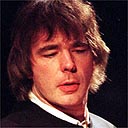
Lloyd Webber is not a name one associates with cutting-edge composition, but cellist Julian has also involved himself with contemporary cello music while exhuming British works from the early part of the 20th century. At this Radio 3 lunchtime concert he performed James MacMillan's Cello Sonata No 2, written specially for Lloyd Webber and premiered in Edinburgh this April.
MacMillan's one-movement work doesn't follow the usual sonata pattern of statement, development and then resolution. Instead, he divides the piece into seven continuous sections that form a musical palindrome, so that by the end we are back with the material we started with - thundering piano and an uncomfortably high trill on the cello. The fulcrum is the elusive fourth section, the cello playing dim reflections of something that might once have been folk song. Elsewhere the music ranges from a mechanical, stomping dance to ethereal cello harmonics.
So early a turning point risks making what follows seem a protracted winding-down; and indeed, one did have too good an idea of what was coming next. Yet there was a sense of resolution too, and when that cello trill returned in the closing bars, it had changed in character. It was no longer a needling, insect-like whine, but a forceful note that had been striven for and finally achieved.
The concert had begun with Fauré's dark-coloured Elégie. As played by Lloyd Webber and his accompanist John Lenehan it was impassioned but not always flowing. There was some stocky phrasing, too, in Brahm's Sonata in E minor. The second movement skipped along a little grudgingly, and a heavy touch from both players made the fugue in the third movement seem drily academic, with the previously sensitive Lenehan at times almost drowning out the cello. Lloyd Webber projects an intense concentration in his stage manner that he can't always sustain in his actual sound. But when he does, as in the whispered phrases that closed the first movement of the Brahms, it's worth the wait.
• This concert will be broadcast again on Radio 3 on Sunday.

